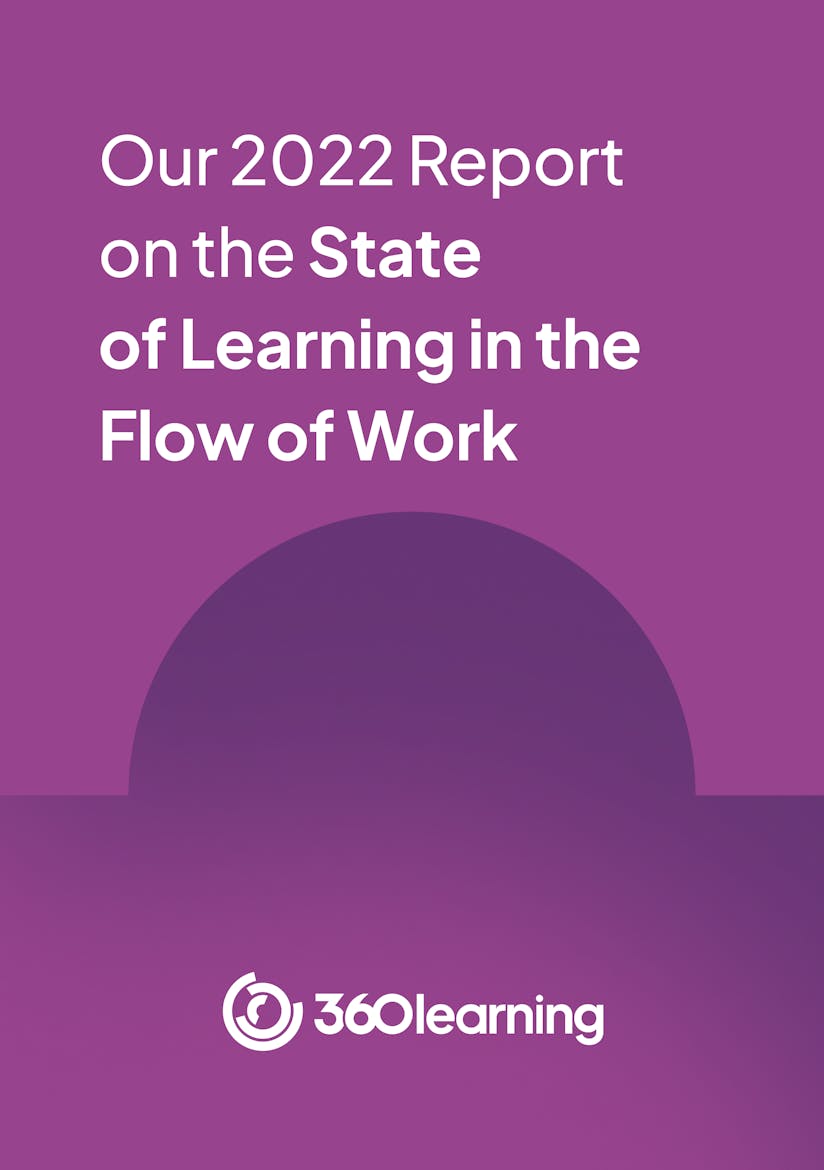
Whether you're a fast casual restaurant or a multinational resort, learning management tools can go a long way toward streamlining your training and development processes. But it’s not enough to randomly pick a learning management system (LMS) off the shelf — you need a platform to help you successfully tackle the hospitality industry’s biggest training challenges.
With the right LMS, you can easily design and deliver engaging training content, track employee progress, and make sure your company stays on top of regulatory changes. It will also make it more convenient for your employees to access and complete training on the go.
How do you decide which LMS will work best for you? By taking an honest look at your top challenges and choosing a learning management tool that has features to address them.

Do your employees need to stop working to start learning?
By providing your contact info, you agree to receive communications from 360Learning. You can opt-out at any time. For details, refer to our Privacy Policy.
1. Peer-driven learning reduces turnover
In 2023, hospitality's biggest challenge continues to be employee retention. Despite steady gains over the last two years, many restaurants are still understaffed by 3.6% compared to pre-pandemic levels.
While no one has all the answers to this complex issue, making learning and employee development a priority in your organization can help. You'll have more engaged participants, which can boost retention. Gallup's State of the American Workplace report notes, “Employees who are engaged are more likely to stay with their organization, reducing overall turnover and the costs associated with it.”
Peer-driven learning is a great way to create a more interactive learning environment. Unlike traditional top-down instruction, it organically builds stronger relationships between your employees and managers. With robust peer training, new hires can identify gaps in your onboarding process and suggest new courses, and your seasoned employees can answer questions in real time. Your training teams can also take advantage of new learning opportunities immediately, instead of waiting for annual training sessions or requests from corporate.
To make peer learning a success, you'll need an LMS that enables team members to share knowledge and collaborate when it's convenient for them. With 360Learning, you can create discussion spaces within each course so employees can asynchronously share experiences and answer each other's questions, even when they work different shifts.
With robust peer training, new hires can identify gaps in your onboarding process and suggest new courses, and your seasoned employees can answer questions in real time.
2. Mobile learning gives shift workers more flexible options
Training isn't easy for frontline teams since they’re not sitting in front of a computer all day. That's where mobile learning comes in. Employees no longer have to attend training on or off-site — they can access and complete required courses from their phones, around their schedule. Plus, your staff can refresh their knowledge while on the job, which can improve their performance and help them better serve customers.
Not all learning management tools offer mobile learning solutions, so look closely at the features offered when choosing an LMS. A properly designed mobile learning system will be accessible on smartphones and tablets and deliver a user-friendly interface. It should also support the ability to download courses and play them offline. The feature is especially useful for staff without reliable internet connections.
And unless you have a lot of extra time on your hands, try to avoid LMS with frameworks that you need to finish building to get up and running. 360Learning, for example, includes a robust, ready-to-use mobile learning app — just upload your content, customize it as needed, and it's good to go.
3. Streamlined onboarding gets employees up and running faster
Onboarding is a big deal in the hospitality industry — it can be the deciding factor for whether a new hire sticks around. A solid onboarding process prepares employees for their new roles and introduces them to your company's values and culture to help with retention and safeguard your brand.
The best learning management tools let you tailor your onboarding process to fit your company's specific needs. When you can personalize learner experiences, you can train employees according to their role or experience level, making training even more relevant. New hires can learn their job duties while completing mandatory compliance training, which increases overall efficiency.
For example, if you're hiring a group of new servers for your restaurant, a customizable LMS lets you create a specific onboarding program for servers that focuses on menu knowledge, customer service, and point-of-sale system operation. For servers with more experience, you can create a streamlined onboarding process that skips over the basics from a typical restaurant training course and gets them out on the floor faster.
360Learning lets you create onboarding paths tailored to your employees' jobs, responsibilities, and locations. You can create as many learning paths as needed—and this can be done both inside the platform or uploaded from an external course content provider.
4. Automating administrative tasks lowers training costs
From food to labor, the hospitality industry continues to feel the weight of rising costs. These hikes have reduced spending across the board, and training budgets are now suffering. Despite the growing need for highly skilled employees, CBRE revealed that some hotels had to cut their training budget by nearly 70% to offset lower revenues.
Smaller training budgets mean you’ll need to do more with less. By using the right LMS, you can offset budget cuts by automating tedious administrative tasks that take up so much time.
Instead of spending hours tracking employee progress or confirming certifications, you can focus on delivering better training. As an example, 360Learning can issue a digital certificate after a course or program is completed. You can set an expiration date for each certificate, and your team can get automated reminders when those certificates are about to expire.
Address one training challenge at a time
COVID-19 created no shortage of issues that the hospitality industry is still struggling with today, so your training challenges aren’t going to be solved overnight. Hang in there! If you’re feeling overwhelmed by all the obstacles ahead, start by prioritizing your most pressing training needs and tackle them one by one.
A good start is to identify your immediate needs with a training needs analysis, to help you better identify your employees’ skills and knowledge gaps. You can also gather feedback from employees and managers to better understand where they think they need the most improvement. Once you clearly understand your most pressing training issues, you can build out a comprehensive learning program in your LMS.




